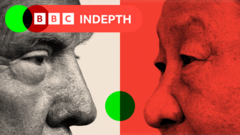In the tranquil surroundings of Beijing’s Temple of Heaven, a group of elderly citizens engage in exercise, embodying a changing societal landscape marked by both personal hope and national concern. As they enjoy the park, their thoughts turn to the shifting tides in global politics, particularly towards the future of relations between the United States and China, especially with Donald Trump’s political resurgence.
Previously, Trump’s enthusiastic remarks about his “love” for Xi seemed to promise a unique diplomacy, but the onset of a volatile trade war marked a stark reversal. Now, deep-seated perceptions alter how both nations view each other amidst fears of tariffs and a “new cold war.” The ordinary citizens in China maintain a mixture of affection and apprehension towards Trump, often viewing him as unpredictable and amusing, yet increasingly wary of his stances.
Amidst this backdrop, strategic power players in Washington present a stark contrast. Recent cabinet choices, from Marco Rubio to Mike Waltz, hint at a harder approach towards China, fueling anxieties about economic and geopolitical stability. Xi, conversely, views this development through a lens of caution, warning that attempts to contain China could lead to confrontation.
While the former president presents a view that emphasizes personal diplomacy, experts warn that rising tensions regarding territorial claims and nuclear capabilities could overshadow that approach. As Trump prepares for office, he will encounter a more fortified Xi, who has leveraged recent geopolitical shifts to consolidate his power, complicating the prospect of collaboration.
Tensions have been exacerbated by events such as the COVID-19 pandemic, during which Trump’s rhetoric turned increasingly hostile, painting China as responsible for global disruptions. With economic ramifications at stake, Chinese officials are attempting to mitigate the impending fallout from potential tariffs through diversification of trade partners and domestic reforms.
Beijing’s strategy may also hinge on figures like Elon Musk, who has garnered significant influence in the political landscape, possibly acting as a mediator to ease tensions with the U.S. However, amidst economic walls and military posturing, the broader narrative of global competition remains unchanged, with both leaders pushing visions for their respective nations.
As public sentiment in China expresses wishes for security, stability, and opportunity amongst youth, the fallout from ideological confrontations and nationalistic ambitions may lead the two superpowers to navigate a tumultuous future. While many in China remain hopeful that they can weather the political storms, the world watches closely to see if Trump and Xi can revitalize their connection or if hostility will reign supreme, defining the geopolitical stage for years to come.




















